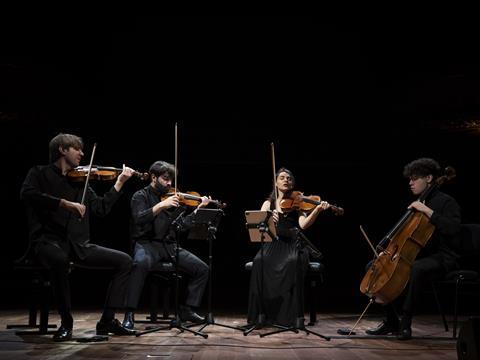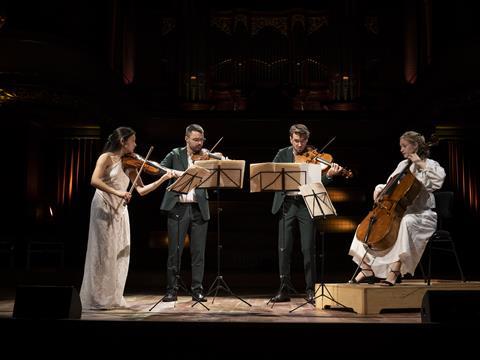Musical and emotional maturity made for an artistic, rather than competitive, experience at the Concours de Genève String Quartet edition, as Rita Fernandes found

Discover more Featured Stories like this in The Strad Playing Hub.
Read more premium content for subscribers here
Number plate prefixes: one of the many quirks I love about Geneva. Look closely, and you’ll see many begin with ‘CD’ (‘Corps Diplomatique’). They are used by some of the 32,000 international civil servants that help make up Geneva’s population of 200,000. It is true that a part of the lakeside city’s identity revolves around international organisations, but the local culture is rich also. The intersection between both worlds fascinates me every time I return, not least of all because it somewhat mirrors my own life: I have a fiercely proud Genevan family but have lived in three countries.
When I attended the Concours de Genève in October, it struck me that the competition is not so different from its host city: it has a Swiss secretary general and support from Geneva’s local government while being a founding member of the World Federation of International Music Competitions and one of the most internationally renowned contests. Founded in 1939, it is one of the oldest competitions still running. String quartet editions ran every few years from 1941 to 1974 and then, after a break, they were – in his own words – ‘brought back’ in 2001 by Didier Schnorhk, secretary general since 1999.
I arrived on 27 October to see the last day of the string quartet semi-finals at the Geneva Conservatoire. The intensity of the four-day round, which for each ensemble included two full recitals and an artistic project, was a point of contention. Chair of the jury Corina Belcea (of the Belcea Quartet) told me she felt it may have been ‘a bit too much. They need to have six full quartets under their hands. We never need to do that normally when we’re touring.’ Schnorhk, who came up with the format, explained that it gives a chance for quartets, regardless of whether they get through to the finals, to be properly heard by the jury, audience and industry professionals. As for the competitors, some saw it as a necessary evil, others took it on as a challenge and others relished the opportunity.

The two standouts were the Elmire Quartet from France and the Novo Quartet from Denmark. I couldn’t help but define the Elmire as ‘French’ as soon as the musicians walked out. This impression was strengthened by the name Elmire, a character from Molière’s play Tartuffe, which, in their words, ‘represents French culture and literature’. While their flair veered dangerously towards the pretentious side at times, it allowed them to offer something unique. And their collective interpretation seemed so ingrained that they had space to shine as individuals. Their absolute commitment in Webern’s Langsamer Satz – a highlight of the competition – was so entrancing that I forgot to take notes, something I realised only when the clapping began.
Next we were off to Denmark, and two words kept coming back throughout the Novo’s recital: flexibility and purity. The ensemble began with Nielsen’s String Quartet no.1 in G minor, easily on par with the Elmire’s Webern. It was as if the musicians had been born knowing the piece. They had an understated confidence, a raw, youthful energy and the flexibility to play around with interpretation. Even visually (they were standing) they seemed to flow as one. The Hana Quartet from Germany, which had performed before I arrived, was the third quartet to go through to the finals with the Elmire and the Novo.
What struck me after only one day of performances was just how different each quartet was. More than in solo contests, what mattered was their interpersonal skills, which are inevitably unique to each of their members. They had to be emotionally intelligent more than anything else. This is what made the performances so interesting. In being older than participants in most other competitions, these players were also more musically mature, which from my perspective made for a more artistically focused judging experience. ‘The quartet competitions are always so convivial, seeing as the members know each other well,’ Schnorhk told me.
It’s easy to say in retrospect, but as soon as the Novo musicians played the first chord, I knew they would win
The differences were even apparent in the way the quartets rehearsed. The Hana was methodical, with each member taking turns to listen from the hall and return with advice. The Elmire played the piece through and ended with an intense debriefing, with few smiles in sight. The joyful stride of the Novo could not have been more different. Its rehearsal, although still disciplined, was filled with the musicians’ laughter and an eager exchange of feedback.
At the 29 October finals in Geneva’s Victoria Hall, I was disappointed by the lack of risk in the programming: the Hana and Novo played Mendelssohn and the Elmire played Beethoven. Schnorhk had shared the sentiment when we chatted earlier that morning. This may have been a natural consequence of such a busy semi-final, as the competitors mentioned how important it was for them to be comfortable with their piece.
The Hana Quartet, although still deserving of its place in the finals, was clearly a step below the Novo and Elmire. In Beethoven’s ‘Rasumovsky’ String Quartet no.8, the Elmire often made odd interpretative decisions, namely one up-up-up-up bowing that prompted the jury to turn to each other with questioning looks, as if to say, ‘Did they really do that there?’ I thoroughly enjoyed the feeling of not knowing where they would go next.

It’s easy to say in retrospect because the Novo did end up winning, but as soon as the musicians played the first chord in the Mendelssohn Quartet no.2 in A minor, I knew they would. It was so pure, perfectly balanced, packed with musicality and yet so simple in its beauty. Although I thought the Nielsen was the their best performance overall, it was the climaxes in the second movement of the Mendelssohn that gave me goosebumps.
Alongside the CHF20,000 first prize, the Novo Quartet swept up almost all the special prizes, including the Young Audience Prize, Students’ Prize, Audience Prize and Concerts de Jussy Prize. Surprisingly, the Elmire and Hana were awarded joint second. The Elmire did however also win the Fondation Etrillard Prize, for best artistic project (presenting an arrangement of Beethoven’s Quartet no.8 featuring an actor).
Following the results, I reflected on what had set the Novo and Elmire apart. It was how well they balanced the group and individual. For the Novo it was a natural by-product of the players’ close friendship. ‘We know how to deal with each other’s problems,’ cellist Signe Ebstrup Bitsch told me. ‘I know Kaya [Novo’s first violinist] needs a McFlurry when she’s stressed!’ For the Elmire, it came from an intense approach to performing these works. I felt that energy as the musicians told me about their artistic project, all excitedly huddled around a snack-laden table backstage.
Not unlike the ambassadors roaming the streets of Geneva, these players are representatives of something larger than themselves. But the human skills still needed to respect each players’ individualities is what made the competition such a captivating one.
Read: Postcard from Switzerland: Verbier Festival
Read: Postcard from Montreal: Montreal International Music Competition
Discover more Featured Stories like this in The Strad Playing Hub.
Read more premium content for subscribers here
The number one source for playing and teaching books, guides, CDs, calendars and back issues of the magazine.
In The Best of Technique you’ll discover the top playing tips of the world’s leading string players and teachers. It’s packed full of exercises for students, plus examples from the standard repertoire to show you how to integrate the technique into your playing.
The Strad’s Masterclass series brings together the finest string players with some of the greatest string works ever written. Always one of our most popular sections, Masterclass has been an invaluable aid to aspiring soloists, chamber musicians and string teachers since the 1990s.
American collector David L. Fulton amassed one of the 20th century’s finest collections of stringed instruments. This year’s calendar pays tribute to some of these priceless treasures, including Yehudi Menuhin’s celebrated ‘Lord Wilton’ Guarneri, the Carlo Bergonzi once played by Fritz Kreisler, and four instruments by Antonio Stradivari.



































![[1st prize] Poiesis Quartet in round 3 (2)](https://dnan0fzjxntrj.cloudfront.net/Pictures/100x67/1/9/5/41195_1stprizepoiesisquartetinround32_547631.jpg)









No comments yet